
President Trump is threatening to bomb Nigeria, alleging the country is failing to protect Christians from persecution, even as many victims of the fundamentalist insurgent group Boko Haram are Muslims. “This theme of persecution of Christians is a very politically charged, and actually religiously charged, theme for evangelicals across the world,” says Anthea Butler, the author of White Evangelical Racism: The Politics of Morality in America. Despite the fact that the country’s conflict cannot be reduced to religious enmity, for extremist evangelical Christians, Nigeria “is a place where the administration could prosecute a holy war” using a “savior narrative.”
Transcript
AMY GOODMAN: This is Democracy Now!, democracynow.org. I’m Amy Goodman.
We end today’s show looking at Nigeria, as President Trump threatened this weekend to bomb Africa’s most populous country, also the largest oil producer in Africa. In a post on Truth Social Saturday, Trump wrote in part, quote, “The U.S.A. will immediately stop all aid and assistance to Nigeria, and may very well go into that now disgraced country, 'guns-a-blazing' … If we attack, it will be fast, vicious, and sweet, just like the terrorist thugs attack our CHERISHED Christians!” he wrote. Defense Secretary Pete Hegseth responded to the post, writing, quote, “Yes sir,” unquote. Trump, on Sunday, again vowed, in his plane, to take action in Nigeria.
PRESIDENT DONALD TRUMP: They’re killing record numbers of Christians in Nigeria. And they have other countries very bad also. You know that. That part of the world, very bad. They’re killing the Christians and killing them in very large numbers. We’re not going to allow that to happen.
AMY GOODMAN: Nigerian officials and experts in the West African region have refuted Trump’s claims of mass killings of Christians. This is a researcher at Good Governance Africa.
MALIK SAMUEL: This is not a Christian genocide, because the facts don’t support it. If you look at the areas where this conflict is rife, even in the — even if you take Borno state alone, you look at northern Borno, many of these communities are Muslim-dominated. So most of the victims of Boko Haram violence are Muslims.
AMY GOODMAN: Nigeria’s government has said it welcomes military aid from the U.S. as long as its sovereignty is respected. This is an adviser to the Nigerian President Bola Tinubu.
DANIEL BWALA: Our soldiers have the capability to deal with this thing, so we do not require the American soldiers’ boots on the ground. What we need is the apparatus, the equipment, the access to some of these things, that will aid our own military force and some of the paramilitary and intelligent operatives to deal with this.
AMY GOODMAN: For more, we’re joined by two guests. In Lagos, Nigeria, we’ll speak with Wole Soyinka, the acclaimed Nigerian playwright, author and poet, the first African to win the Nobel Prize for Literature. It happened in 1986. The Trump administration recently revoked his visa to come to the United States. The decision came after Soyinka referred to President Trump as the “white version” of the ruthless Ugandan military dictator Idi Amin.
And we’re joined by Anthea Butler, professor of religious studies at University of Pennsylvania. Her most recent book is titled White Evangelical Racism: The Politics of Morality in America.
Professor Butler, we’re going to begin with you. Can you explain? Were you surprised by President Trump going after Nigeria this weekend, saying they could bomb, they could strike, they could move in with guns blazing, saying Christians are being killed there? Can you explain where this is coming from?
ANTHEA BUTLER: I’m never surprised at the hyperbole of our president. Let me just say this. I think that this has been a long-standing concern of evangelical Christians in the United States. And so, if you think about this in terms of the president’s base, this is a move, I think, in part, to energize them, to have them think that he is thinking about Christians in other places. So, this theme of persecution of Christians is a very politically charged, and actually religiously charged, theme for evangelicals across the world. And when you say that Christians are being persecuted, that’s a thing.
So, for him to say this on Truth Social, I think, provides two things. One is, this is something that the administration is thinking about insofar as somebody probably told them to think about it. That’s number one. And number two, it serves another purpose. It serves to energize his base.
And so, while this issue of religious violence has been prevalent in Nigeria for lots of different reasons, I would submit to you that it’s not simply just about violence against Christians, but it’s religiously inflicted violence because of different factions that are on the ground and groups. And this is not just about Christians, but it’s also involving Muslims. It’s involving other groups that are there. It’s a complicated situation.
AMY GOODMAN: In fact, with Boko Haram, you have them most attacking in the north, and in the north, it’s more Muslims that are being killed than Christians. It’s not that there isn’t violence, but the Nigerians are questioning whether this is religiously based. So, the question is: Is this coming from the United States? Trump said he asked Congressmember Riley Moore of West Virginia and Congressmember Tom Cole of Oklahoma and the House Appropriations Committee for a report on the matter. Congressman Moore had sent a letter to Secretary of State Rubio urging the Trump administration to take immediate action to address systematic persecution and slaughter of Christians in Nigeria, saying that Nigeria is the deadliest place in the world to be a Christian. So, talk more about the white Christian nationalists in the United States going after Africa’s most populous country — and maybe of relevance, the largest oil producer, as Venezuela is in Latin America, which President Trump is threatening to attack, but the largest oil producer in Africa.
ANTHEA BUTLER: Yeah, I find that very interesting that these are two oil-rich states that he is interfering in. So, that’s number one.
Number two, let me say this about Nigeria and Christianity. There has been a religiously sort of back-and-forth between Nigeria and America for a very long time. If you think about that towards televangelists, and that sort of exploded in the 1990s. In the 2000s, you have many giant megachurches. So, it’s no surprise that, you know, politicos here, especially those who are Republican and Christian, would be interested in Nigeria for not just, you know, financial gain, but also because this is a country that in the south is predominantly Christian. OK? So, that’s number one.
And number two, I think, which is actually even more important, is that this is a place where the administration could prosecute a holy war. And what I mean by that is that they can use certain kinds of things that have happened in the news. If you think back two years ago, there was a massacre of Christians during the Christmas season. There have been, you know, Boko Haram capturing girls. These were mostly Muslim girls, actually. If we think about all of these cases, this falls into that kind of framework that evangelicals understand, first of all, and then, secondarily, it fits this sort of savior narrative of this American sort of ethos right now that is seeing itself going into countries for a moral war, a moral suasion, as it were, to do something to help other people.
Now, I think it’s very interesting to also think about the fact that the president of Nigeria is a Muslim. He is married to a Christian wife. Nigeria is complicated religiously. And I don’t think that the ways in which that this has been portrayed in, you know, the popular ways in which we report on what he says — right? — the president says, is a way that you should understand Nigeria. It is much more complicated religiously. There’s religious violence. There have been people in this country for years who have been working on this through various administrations, and it certainly was going on during the first round of the Trump administration, but he didn’t seem to care about it then. Why now?
AMY GOODMAN: And finally, before we go to Wole Soyinka, the Trump administration sharply reducing the number of refugees admitted annually to the U.S. to 7,500 people, from like 125,000. Most of those 7,500 will be white South Africans who are mostly Christian.
ANTHEA BUTLER: Yes. I mean, I think this is sort of disingenuous to say you’re going to go in and save Christianity in Nigeria, when you have, you know, banned Nigerians from coming to this country. It’s very crucial in a way, because I think about this in terms of places like Houston, Texas, where Nigerians make up a huge part of the population there, and they are very active in engineering, finance, in medical issues, medical doctors, things like that. You are banning a community that is very — how shall I say? — that when it comes to the United States for education or to work, very professionalized. This is not, you know, people who are coming because they want to seek asylum. They are coming to contribute, and they want to be able to come in. But the fact that this administration is, on the one hand, saying, “We want to go in and save Nigeria,” but, on the other hand, not let Nigerians into the country — you’re only going to let South Africans in, and white South Africans to boot — that is pretty much telling you exactly where this Christian nationalist administration is.
AMY GOODMAN: Well, Anthea Butler, professor at the University of Pennsylvania, we thank you for being with us.

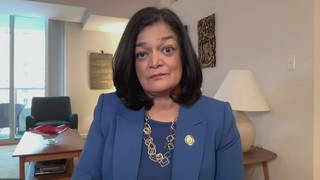
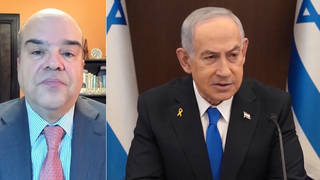
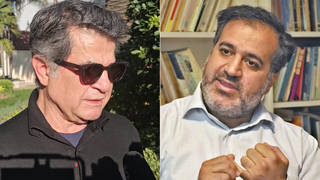
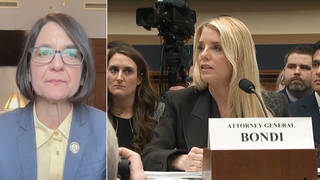





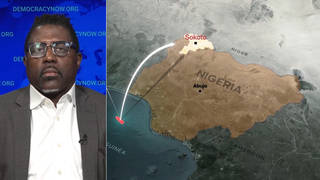

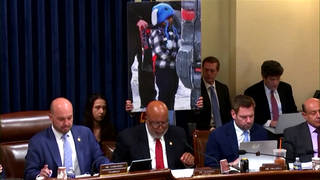
Media Options